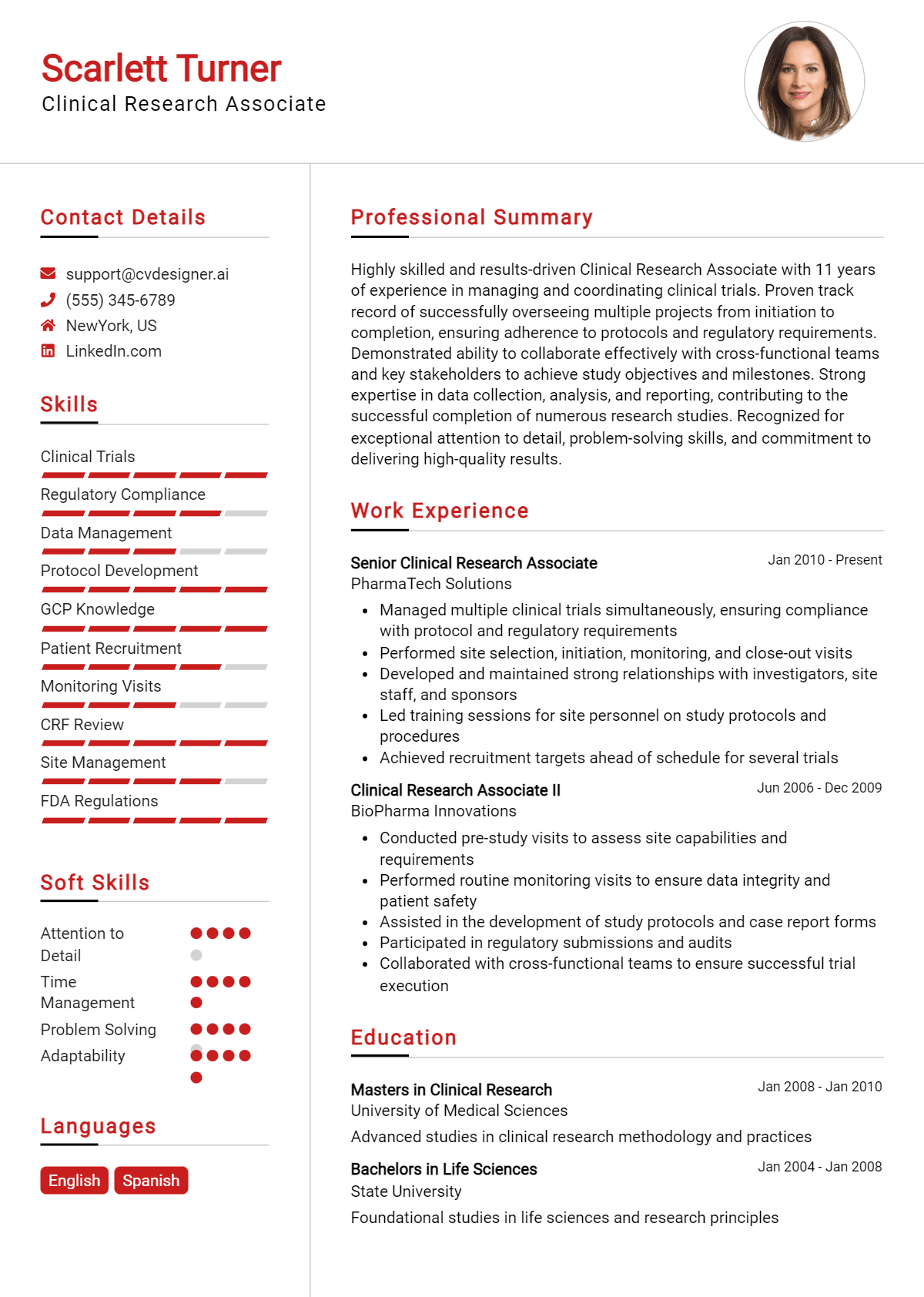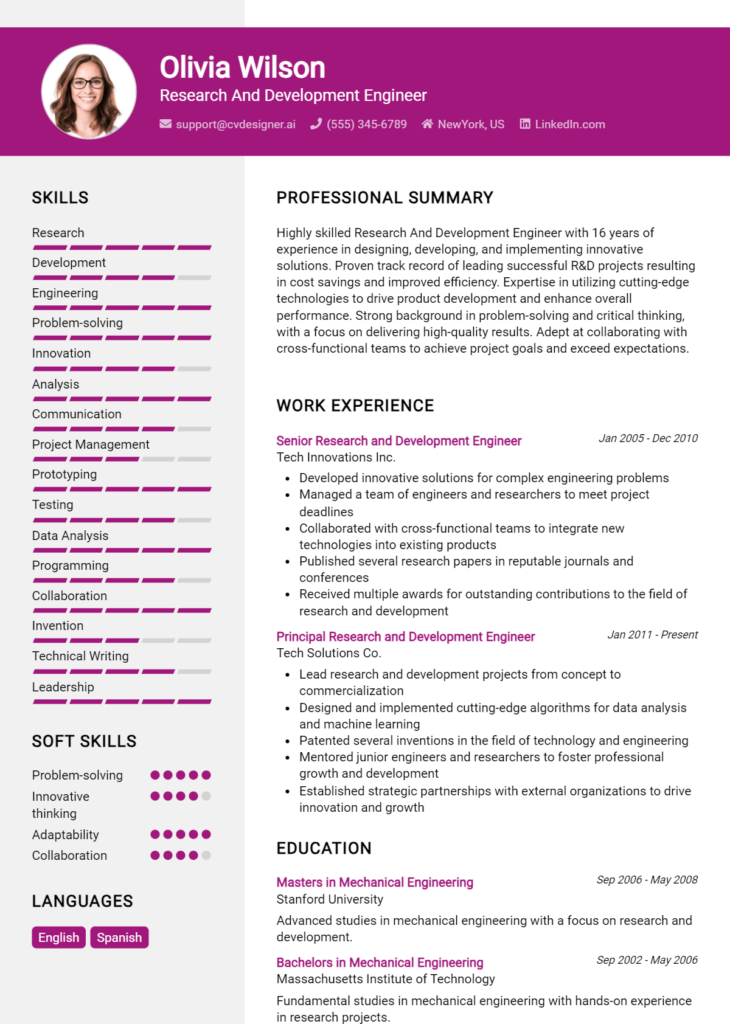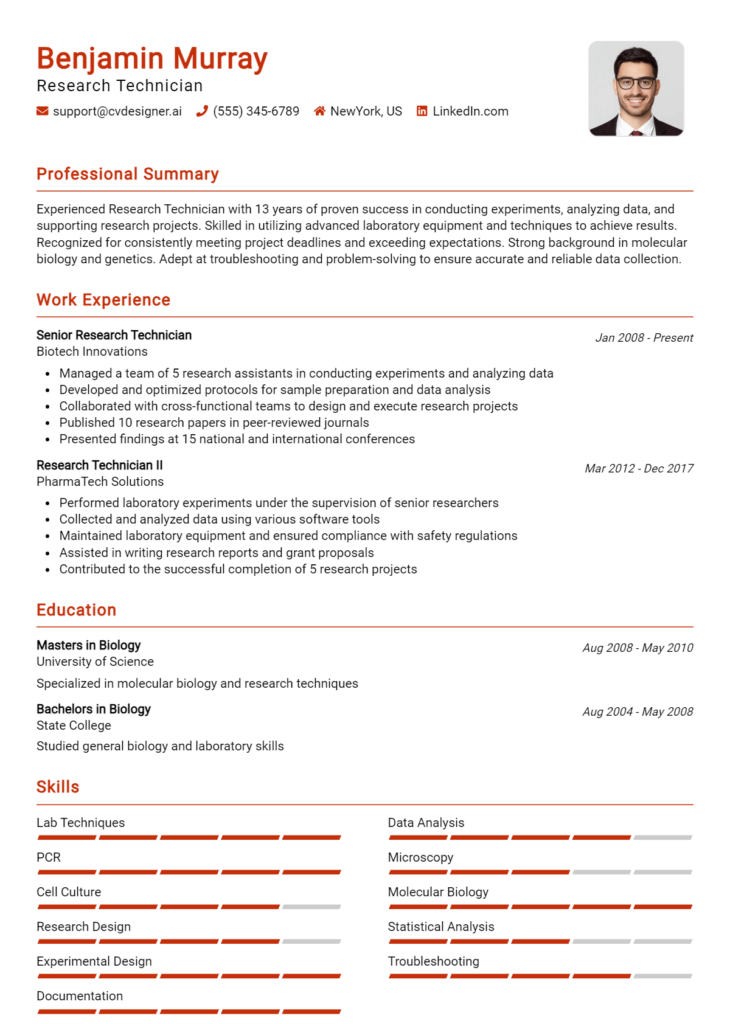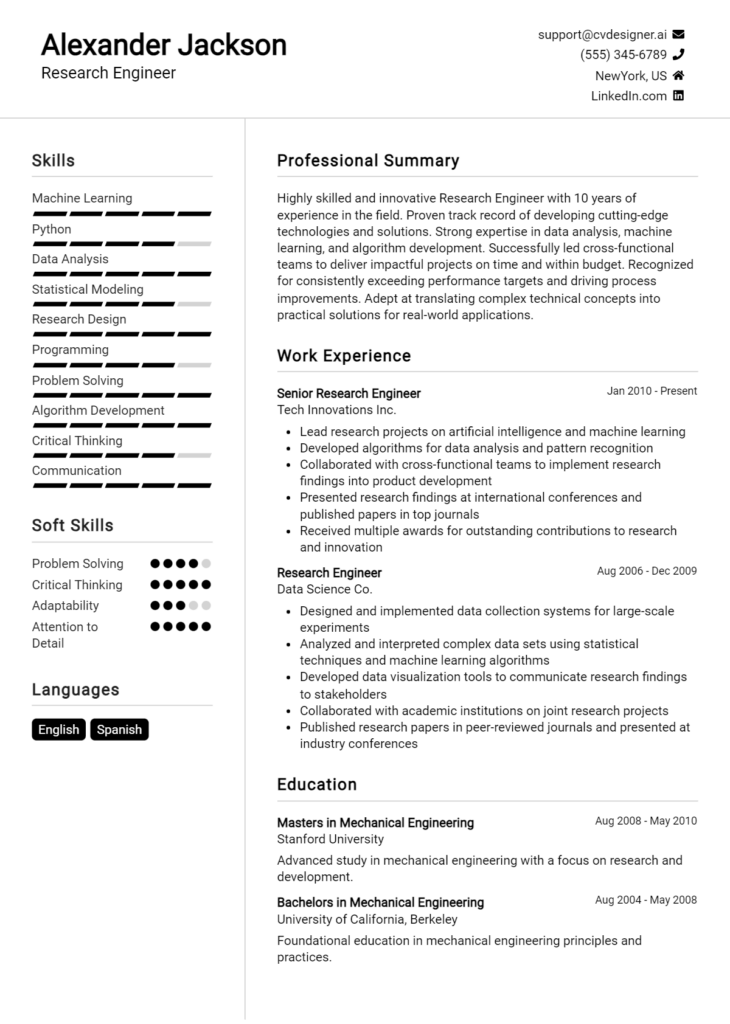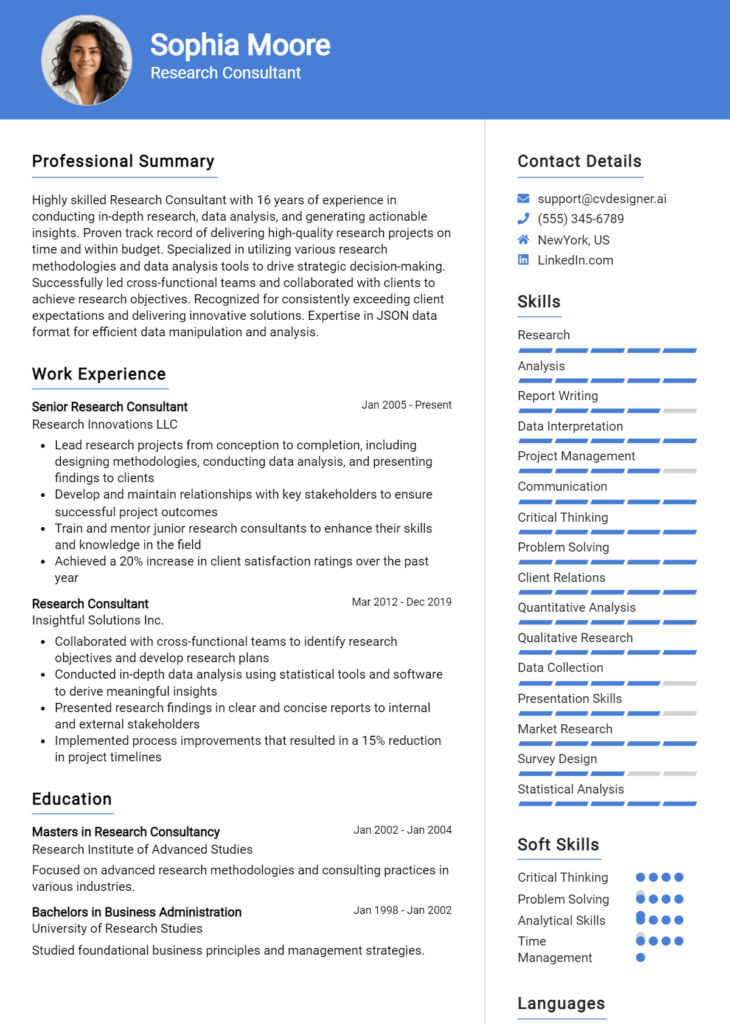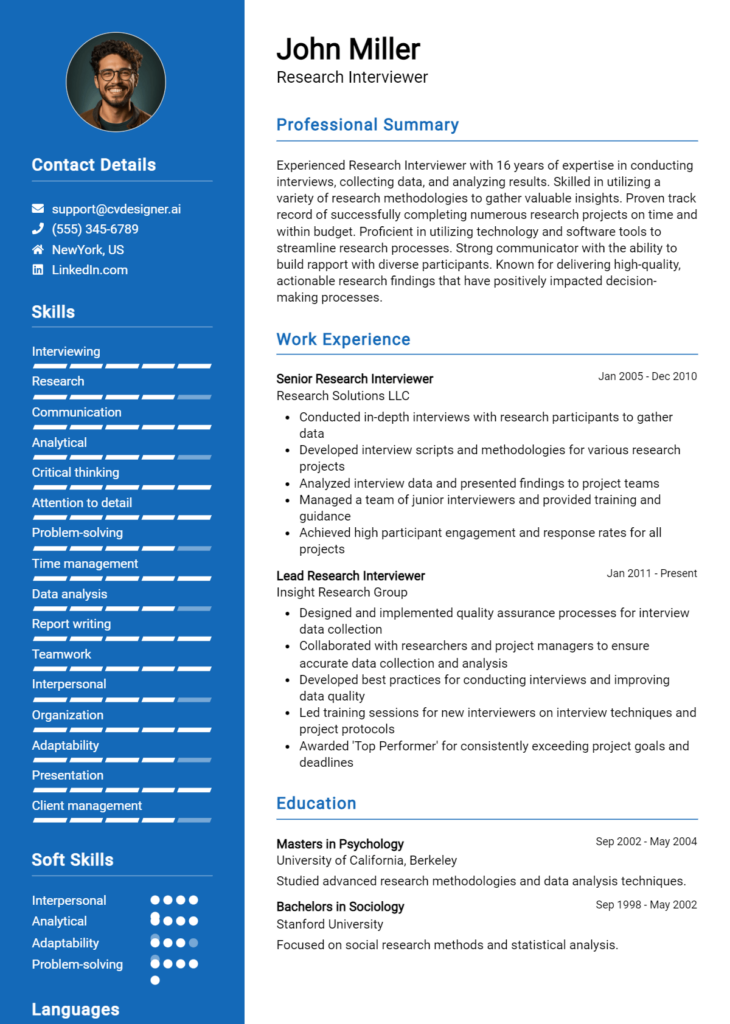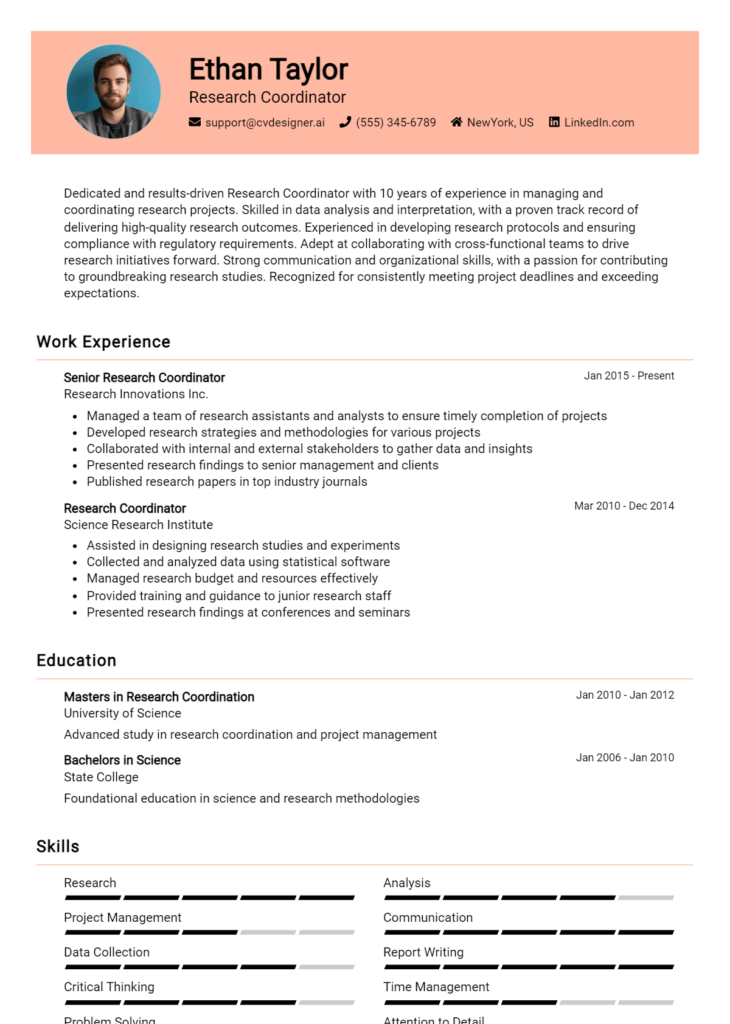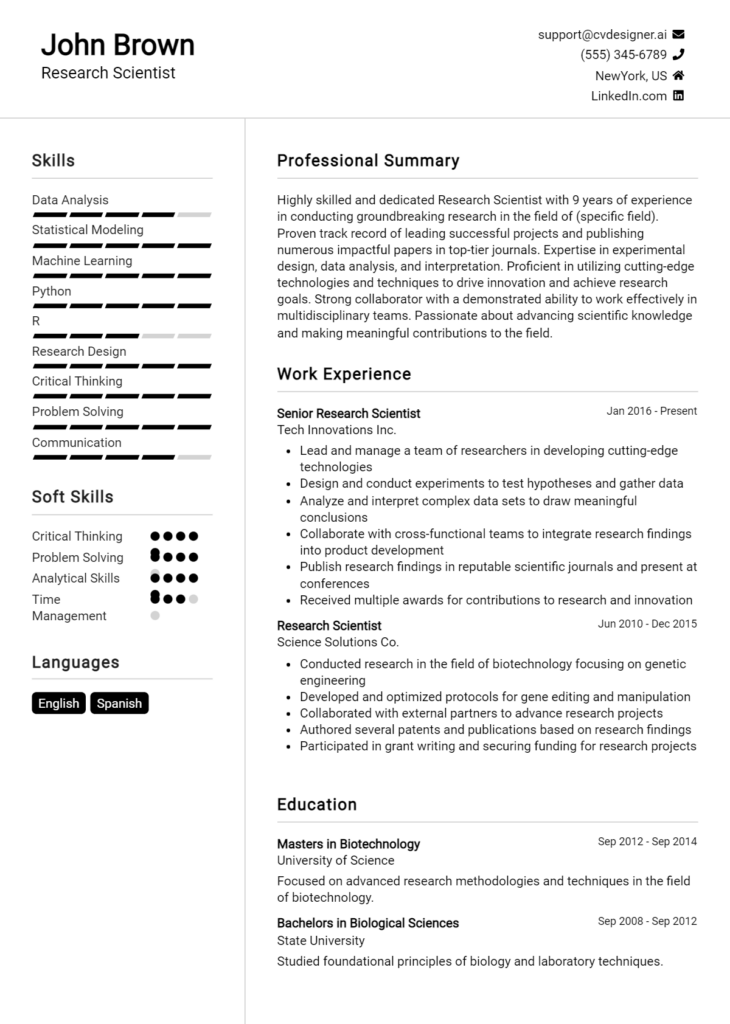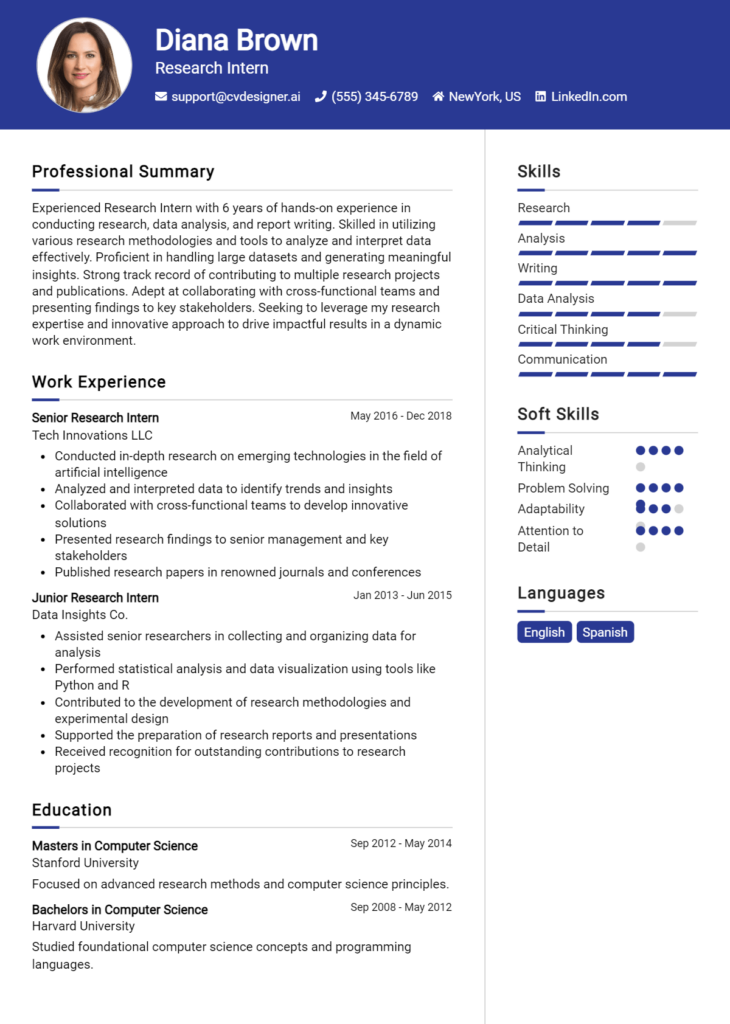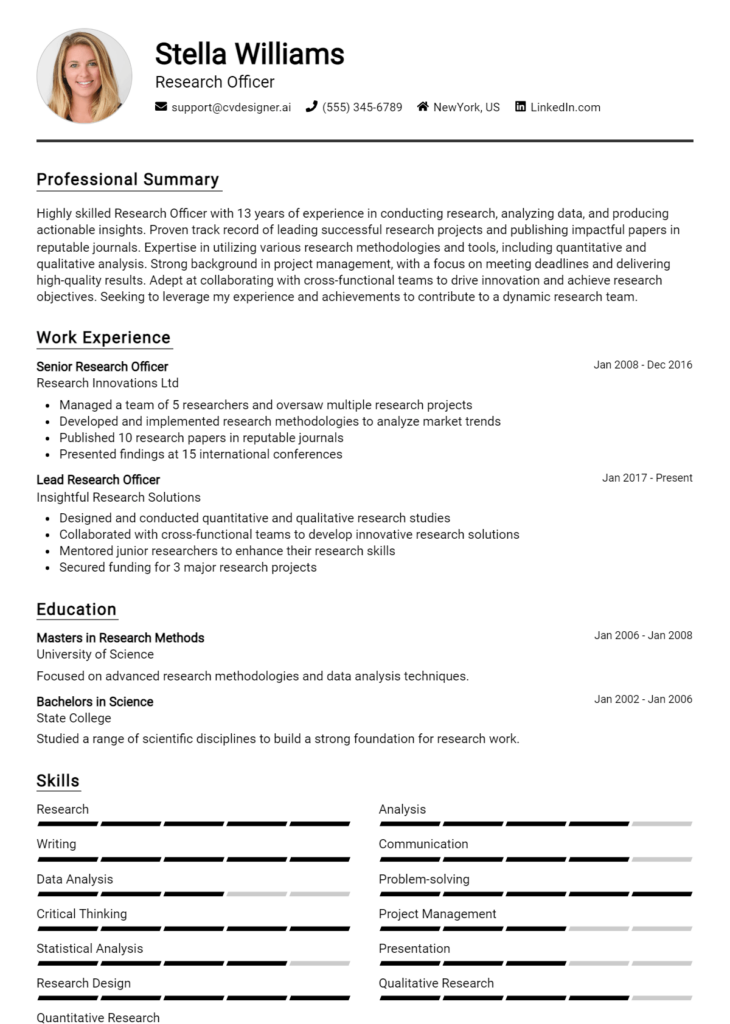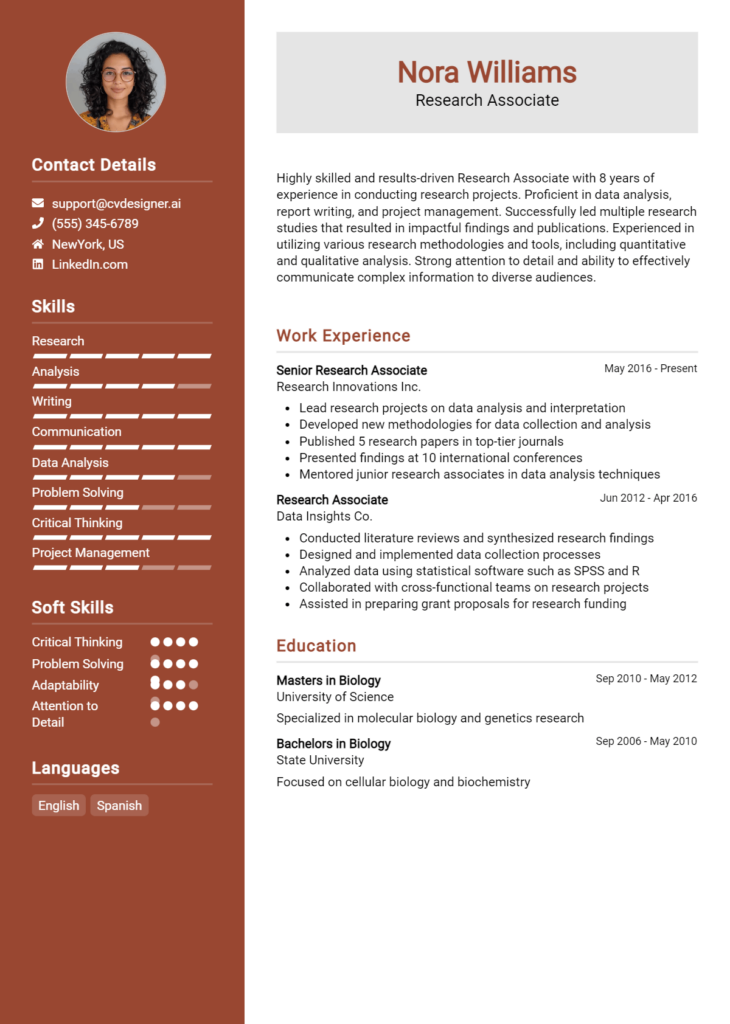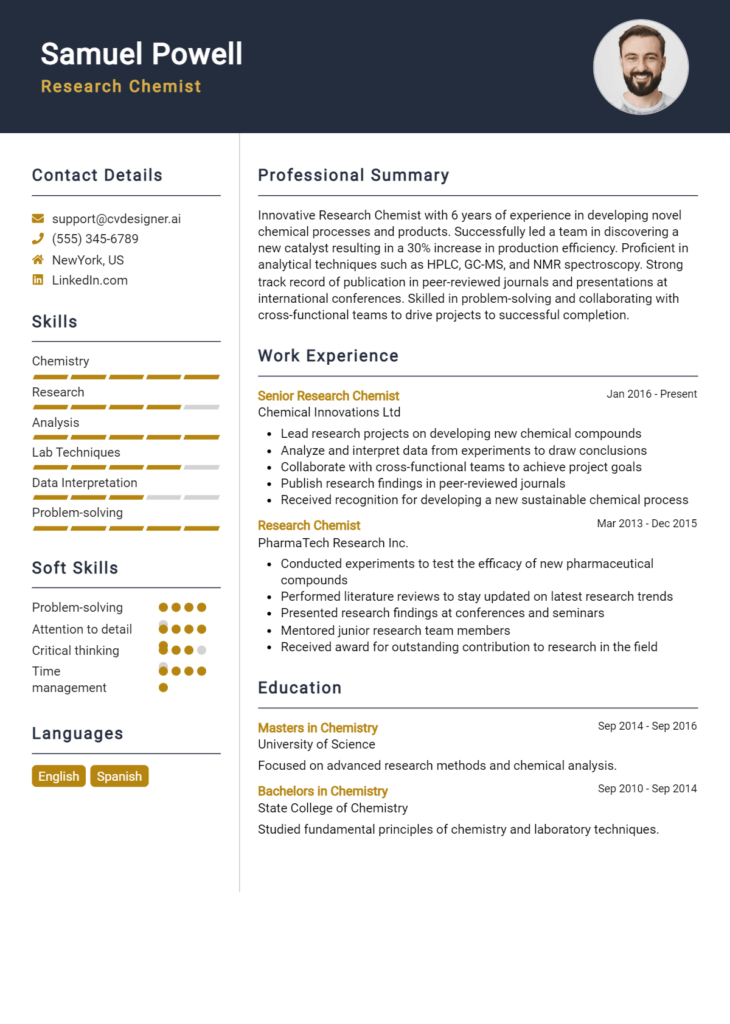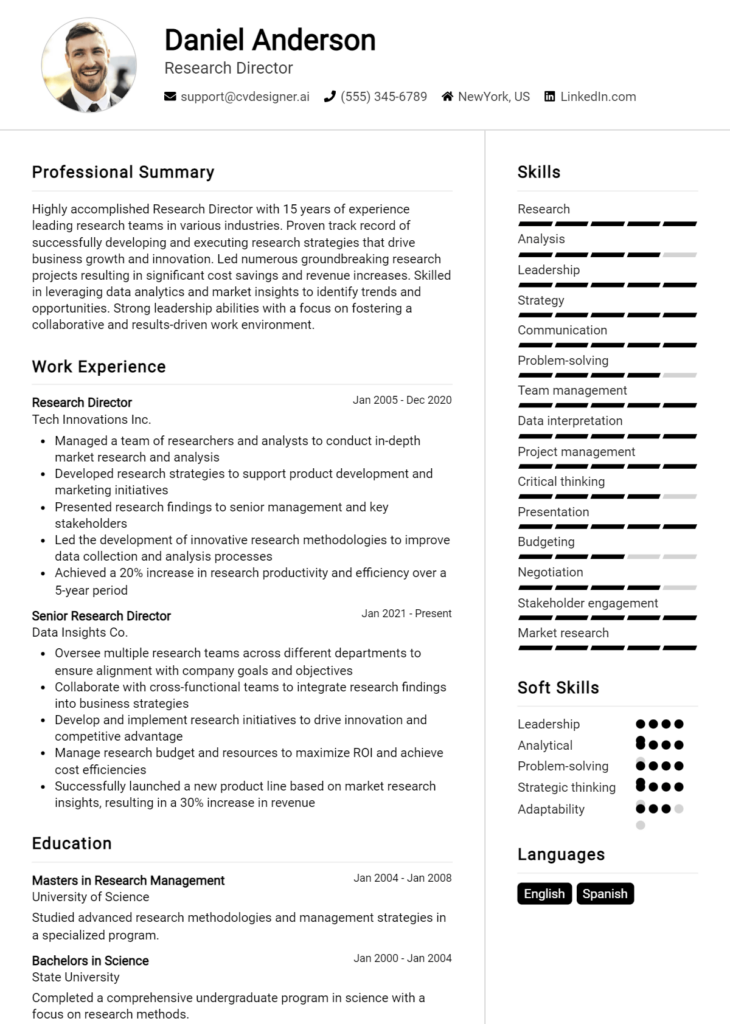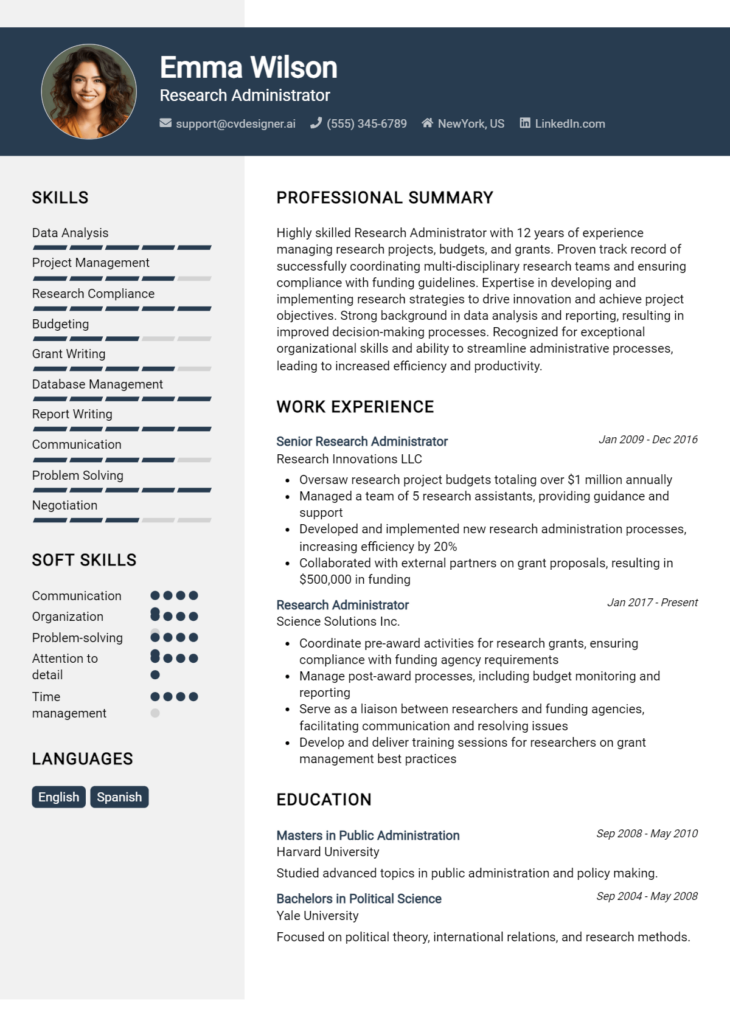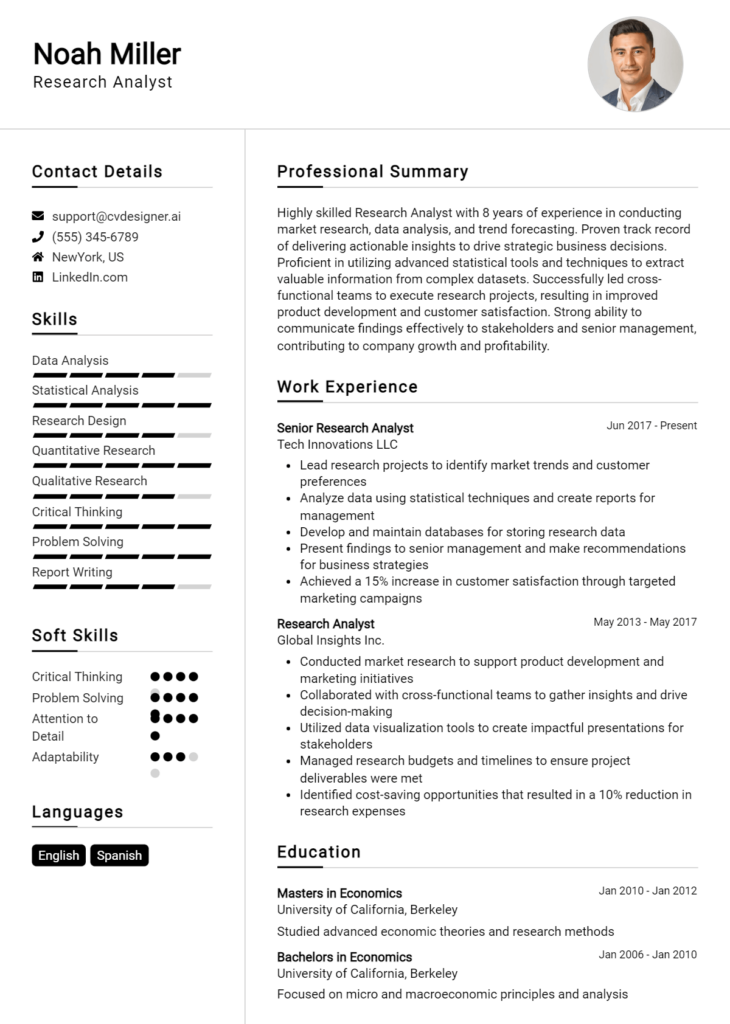Most Popular Clinical Research Associate Resume Examples
Explore additional Clinical Research Associate resume samples and guides and see what works for your level of experience or role.
As the bridge between clinical trials and regulatory compliance, a Clinical Research Associate (CRA) plays a pivotal role in advancing medical science and improving patient care. With the responsibility of monitoring clinical trials, ensuring adherence to protocols, and safeguarding participant welfare, a CRA's expertise is vital for the successful completion of research studies. Given the competitive landscape of clinical research, crafting a compelling resume is essential to stand out among other candidates. A well-structured resume not only highlights your qualifications but also reflects your understanding of the industry's nuances and your commitment to excellence.
In this comprehensive guide, we will delve into the specific responsibilities and skills that define a successful Clinical Research Associate. You'll discover the best resume formats to showcase your experience effectively, as well as common pitfalls to avoid that could undermine your chances of landing an interview. We will provide resume examples tailored for all career levels—from entry-level positions to seasoned professionals—ensuring you find inspiration no matter where you are in your career journey. Additionally, we will share invaluable tips on resume writing best practices, along with guidance on selecting the right resume templates to elevate your application. Whether you're entering the field for the first time or looking to advance your career, this guide is your roadmap to crafting a standout resume that captures the attention of hiring managers in the clinical research sector.
Key Responsibilities and Skills for a Clinical Research Associate
As a Clinical Research Associate (CRA), you play a vital role in the clinical trial process, ensuring that studies are conducted in compliance with regulatory standards and good clinical practices. Your responsibilities often include:
- Monitoring clinical trials: Conduct site visits to ensure adherence to the study protocol and regulatory requirements.
- Data collection and management: Ensure accurate and timely collection of study data and maintain comprehensive records.
- Site selection and initiation: Assess and select clinical trial sites, and assist in the initiation and training of site staff.
- Collaboration: Work closely with investigators, site staff, and other stakeholders to facilitate smooth trial operations.
- Troubleshooting: Identify and resolve issues that may arise during the study, ensuring minimal disruption to the trial process.
- Regulatory compliance: Ensure that all documentation and processes adhere to applicable regulations and guidelines.
Essential skills required for a Clinical Research Associate include:
- Strong understanding of clinical trial regulations (e.g., ICH-GCP)
- Excellent organizational and project management skills
- Effective communication and interpersonal skills
- Attention to detail and analytical thinking
- Ability to work independently and as part of a team
- Proficiency in data management and clinical trial software
Highlighting these skills effectively in the resume skills section is crucial for demonstrating your qualifications to potential employers. Tailoring them to the job description ensures that your application stands out and aligns with the specific needs of the employer. Additionally, consider how these skills can be presented in your CV to showcase your expertise and readiness for the challenges of a Clinical Research Associate role.
Best Resume Format and Structure for a Clinical Research Associate
When crafting a resume for a Clinical Research Associate (CRA) position, it's essential to choose a format that highlights your qualifications and experiences effectively. Here’s a detailed guide on the best resume format and structure, along with tips on what to include in each section.
Contact Information
- What to Include: Your name, phone number, email address, and LinkedIn profile (optional). Make sure your email sounds professional.
- Format Tip: Use a clear, legible font and place your contact information at the top of the resume.
Professional Summary
- What to Include: A brief overview (2-4 sentences) that summarizes your experience, key skills, and what you bring to the role. Focus on your knowledge of clinical trials, regulatory guidelines, and any specific therapeutic areas you are familiar with.
- Format Tip: Use bullet points or a short paragraph for clarity. Tailor this section to match the specific job you are applying for.
Work Experience
- What to Include: List your previous positions in reverse chronological order. For each role, include:
- Job Title
- Company Name
- Location (City, State)
- Dates of Employment
- Key Responsibilities and Achievements (use bullet points for easy reading)
- Format Tip: Use action verbs and quantify achievements where possible (e.g., "Managed X clinical trials resulting in Y% increase in efficiency"). This section should be the most substantial part of your resume.
Education
- What to Include: Your highest degree first, followed by any relevant certifications. Include:
- Degree Type (e.g., B.S. in Biology)
- Institution Name
- Graduation Date
- Honors or relevant coursework (optional)
- Format Tip: Keep this section concise, focusing on your most pertinent educational experiences.
Skills
- What to Include: A list of relevant skills such as:
- Knowledge of Good Clinical Practice (GCP)
- Regulatory compliance (FDA, EMA guidelines)
- Proficiency in clinical trial management software (e.g., EDC systems)
- Strong communication and organizational skills
- Format Tip: Use bullet points or a simple list format. Consider grouping skills into categories (e.g., Technical Skills, Soft Skills) for better readability.
Certifications
- What to Include: Any relevant certifications, such as:
- Certified Clinical Research Associate (CCRA)
- Good Clinical Practice (GCP) certification
- Clinical Research Coordinator (CRC) certification
- Format Tip: List certifications with the title, issuing organization, and date obtained.
Additional Sections (if applicable)
- Publications: List any relevant research publications, especially if they relate to clinical trials.
- Professional Affiliations: Memberships in organizations like the Association of Clinical Research Professionals (ACRP) can be beneficial.
- Volunteer Experience: Relevant volunteer work can showcase your commitment and additional skills.
Formatting Tips
- Font and Layout: Choose a clean, professional font (e.g., Arial, Calibri) and maintain consistent formatting throughout. Use headings to separate sections clearly.
- Length: Aim for a one-page resume if you have less than 10 years of experience. For more extensive experience, two pages may be acceptable.
- File Format: Save your resume as a PDF to preserve formatting when sending it electronically.
Complementing Your Cover Letter
The resume format should align with your cover letter format to create a cohesive application. Use the same font, headings, and overall styling in both documents. In your cover letter, expand on key experiences highlighted in your resume, providing a narrative that showcases your passion for clinical research and how you fit the role.
By following this structured approach, you will create a comprehensive resume that effectively presents your qualifications as a Clinical Research Associate, making a strong impression on potential employers.
Writing Tips and Best Practices for a Clinical Research Associate Resume
When crafting a resume as a Clinical Research Associate, it’s essential to present your qualifications clearly and professionally to stand out in a competitive job market. Highlight your relevant experience, education, and skills while ensuring your resume is tailored to the specific role you’re applying for. Use resume writing tips to enhance the overall appearance and effectiveness of your document. Remember, a well-structured resume will not only showcase your expertise but also demonstrate your attention to detail, a crucial attribute in clinical research. Additionally, bear in mind that many of these tips can also be beneficial when drafting a cover letter.
- Utilize action verbs such as "managed," "coordinated," and "analyzed" to convey your responsibilities and achievements effectively.
- Quantify your accomplishments by including specific metrics, such as the number of clinical trials managed or the percentage of successful outcomes.
- Incorporate industry-specific keywords and jargon relevant to clinical research, such as "GCP," "IRB," "protocol adherence," and "data management," to pass through Applicant Tracking Systems.
- Tailor your resume for each application by aligning your skills and experiences with the job description and requirements.
- Keep your resume concise, ideally one page, focusing on the most relevant information that highlights your qualifications.
- Use bullet points for easy readability and to clearly outline your responsibilities and achievements in previous roles.
- Include a section for relevant certifications or training, such as Clinical Research Coordinator (CRC) or Clinical Research Associate (CRA) certifications, to demonstrate your commitment to the field.
- Remember to proofread your resume for any grammatical or typographical errors, as professionalism is key in the clinical research environment.
Common Mistakes to Avoid in a Clinical Research Associate Resume
When crafting a resume for a Clinical Research Associate (CRA) position, it's crucial to present your qualifications and experience in a way that stands out to potential employers. However, many candidates make common mistakes that can hinder their chances of landing an interview. Avoiding these pitfalls will help ensure that your resume effectively showcases your skills and expertise in clinical research. Here are some frequent errors to watch out for:
- Overloading the resume with excessive information, making it difficult to read.
- Using generic descriptions that fail to highlight specific skills and accomplishments.
- Neglecting to tailor the resume for the specific CRA position or company.
- Failing to include relevant keywords that align with the job description.
- Using a cluttered or unprofessional format that detracts from the content.
- Omitting quantifiable achievements that demonstrate your impact in previous roles.
- Listing outdated or irrelevant experience that does not pertain to clinical research.
- Ignoring the importance of proofreading for spelling and grammatical errors.
- Not including a clear objective or summary statement that outlines your career goals.
- Using passive language rather than strong action verbs to convey your contributions.
To further enhance your resume, consider reviewing the common mistakes to avoid in a resume to ensure your document is polished and effective. Additionally, don't overlook the importance of your cover letter; mistakes in that area can also be detrimental to your application. Check out the common cover letter mistakes to ensure your entire application package is compelling and professional.
Sample Clinical Research Associate Resumes
As a Clinical Research Associate (CRA), you play a crucial role in the development of new medical treatments and therapies, ensuring compliance with regulatory standards and the integrity of clinical trials. Crafting a strong resume is essential to showcase your skills and experience in this competitive field. Below are three sample resumes tailored for different levels of experience within the CRA profession: an experienced professional, an entry-level candidate, and a career changer.
Sample Resume: Experienced Clinical Research Associate
Jane Doe
1234 Elm Street
City, State 12345
(123) 456-7890
janedoe@email.com
Professional Summary
Detail-oriented Clinical Research Associate with over 7 years of experience in managing clinical trials and ensuring compliance with GCP regulations. Proven track record of effectively coordinating study sites, training staff, and maintaining study documentation. Exceptional analytical skills and a commitment to advancing clinical research.
Experience
Clinical Research Associate
ABC Clinical Trials, City, State
March 2018 – Present
- Managed 10+ clinical trials across various therapeutic areas, ensuring adherence to protocols and regulatory requirements.
- Collaborated with study coordinators and principal investigators to conduct site initiation visits and monitor site performance.
- Developed and maintained study-related documentation, including informed consent forms and regulatory submissions.
Clinical Research Coordinator
XYZ Research Institute, City, State
January 2015 – February 2018
- Assisted in the planning and execution of clinical trials, overseeing patient recruitment and data collection.
- Conducted regular site visits to ensure compliance with study protocols and addressed any issues that arose.
- Trained new staff on clinical trial protocols and data management systems.
Education
Bachelor of Science in Nursing
University of Health Sciences, City, State
Graduated: May 2014
Certifications
- Certified Clinical Research Associate (CCRA)
- Good Clinical Practice (GCP) Certification
Sample Resume: Entry-Level Clinical Research Associate
John Smith
5678 Oak Avenue
City, State 67890
(987) 654-3210
johnsmith@email.com
Objective
Motivated and detail-oriented recent graduate with a Bachelor's degree in Biology seeking an entry-level Clinical Research Associate position. Eager to apply my academic knowledge and passion for clinical research to contribute to successful trial management.
Education
Bachelor of Science in Biology
University of Science, City, State
Graduated: May 2023
Relevant Coursework
- Clinical Trials and Ethics
- Pharmacology
- Biostatistics
Internship Experience
Clinical Research Intern
DEF Research Labs, City, State
June 2022 – August 2022
- Assisted in the preparation and execution of clinical trial protocols under the supervision of senior CRAs.
- Reviewed clinical trial documentation for accuracy and compliance with regulatory guidelines.
- Participated in patient recruitment efforts and data entry tasks for ongoing studies.
Skills
- Strong analytical and problem-solving abilities
- Proficient in Microsoft Office Suite and clinical trial management software
- Excellent communication and teamwork skills
Sample Resume: Career Changer to Clinical Research Associate
Emily Johnson
9101 Pine Street
City, State 54321
(321) 654-9870
emilyjohnson@email.com
Summary
Dedicated healthcare professional with 5 years of experience in patient care and a strong desire to transition into clinical research. Demonstrated ability to manage complex tasks and collaborate with multidisciplinary teams. Committed to enhancing patient outcomes through rigorous clinical research practices.
Experience
Registered Nurse
GHI Medical Center, City, State
June 2018 – Present
- Provided direct patient care in a fast-paced environment, collaborating with physicians and other healthcare providers.
- Educated patients about treatment plans and clinical study options, promoting understanding of ongoing research.
Healthcare Assistant
JKL Rehabilitation Facility, City, State
January 2016 – May 2018
- Supported patients with daily activities while assisting healthcare professionals in delivering quality care.
- Documented patient progress and communicated effectively with the healthcare team.
Education
Bachelor of Science in Nursing
University of Health Sciences, City, State
Graduated: May 2016
Professional Development
- Clinical Research Training Course
- Good Clinical Practice (GCP) Certification
For more inspiration and a variety of styles, explore additional resume templates. To complement your resume, consider crafting a compelling cover letter using our collection of cover letter examples to create a complete job application package.
Checklist for a Clinical Research Associate Resume
- Proofread for Typos and Grammatical Errors: Carefully read through your resume to catch any spelling or grammatical mistakes. Even minor errors can create a negative impression.
- Check for Consistency in Formatting: Ensure that font types, sizes, and styles are consistent throughout the document. This includes headers, bullet points, and margins.
- Tailor the Resume to the Job Description: Customize your resume for the specific Clinical Research Associate position you are applying for, highlighting relevant skills and experiences that match the job requirements.
- Use Action Verbs: Start each bullet point with strong action verbs (e.g., "managed," "coordinated," "analyzed") to convey your achievements and responsibilities effectively.
- Include Relevant Certifications and Training: List any certifications or training related to clinical research, such as Good Clinical Practice (GCP) or Clinical Research Coordinator (CRC) certification, to enhance your qualifications.
- Quantify Achievements: Wherever possible, use numbers to quantify your accomplishments (e.g., "monitored 15 clinical trials," "increased patient enrollment by 20%") to provide concrete evidence of your contributions.
- Keep it Concise: Aim for a one-page resume unless you have extensive experience. Be concise and only include information that is relevant to the position.
- Utilize a Professional Format: Consider using an AI resume builder to ensure your resume is well-organized, visually appealing, and adheres to industry standards.
- Include Contact Information: Make sure your contact details (name, phone number, email, LinkedIn profile) are easy to find and up-to-date.
- Consider Similar Checklists for Other Documents: Remember that a similar checklist can be followed for creating a CV or cover letter.
Key Takeaways for a Clinical Research Associate Resume Guide
In conclusion, crafting a strong Clinical Research Associate resume is crucial for standing out in a competitive job market. By utilizing the provided examples and tips, you can build a resume that effectively showcases your skills, experiences, and qualifications. We encourage you to take the next steps by downloading a professional template from our resume templates, or if you need assistance with your application, consider using our best resume maker or exploring our cover letter templates. Remember, following similar guidelines will also aid you in developing a compelling CV and an impactful cover letter. Begin your journey towards a successful career in clinical research today!
